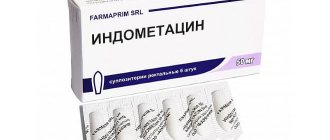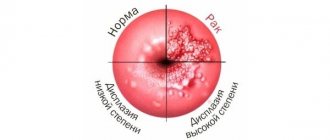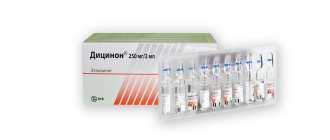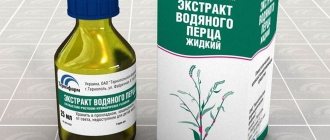The drug belongs to the group of vitamins that are produced artificially. “Vikasol” is an analogue of the lipophilic forms of water-soluble (fat-soluble) and hydrophilic vitamins, which are necessary for the connection of proteins that provide the required degree of association of small dispersed particles into larger ones (vitamin K). The trace element takes part in the formation of a protein that stimulates the formation of a blood clot. Normalizes the blood clotting index. Insufficient vitamin K can lead to increased bleeding.
Vikasol for uterine bleeding
Vikasol is a soluble analogue of vitamin K, it is obtained synthetically.
Vitamin K deficiency in the body leads to increased bleeding. Vikasol is involved in the formation of prothrombin, which normalizes blood clotting. Vikasol is produced in powder form, tablets and ampoules.
Indications for use of Vikasol
Vikasol in the form of tablets and injections is prescribed for dysfunctional and juvenile uterine bleeding before puberty and in the premenopausal period.
In addition, the drug is prescribed for jaundice caused by untimely entry of bile into the intestines, parenchymal and capillary bleeding, stomach and duodenal ulcers, radiation sickness, thrombocytopenic purpura, persistent hemorrhoidal and nosebleeds.
Vikasol can be prescribed to a pregnant woman in the last trimester to prevent bleeding in the newborn. In addition, it can also be used to treat newborns with increased bleeding.
Vikasol prevents a decrease in blood clotting, but for hemophilia it does not bring the necessary therapeutic result.
Instructions for Vikasol for uterine bleeding
Studies have shown that Vikasol during menstruation is quite capable of significantly reducing the amount of heavy discharge. However, the desired result may not be achieved in all cases, and therefore you should not prescribe Vikasol yourself during menstruation, without even undergoing an examination by a gynecologist. Moreover, if there is a suspicion of uterine bleeding, which in general can only be subject to surgical treatment. Only a doctor can prescribe Vikasol. Uterine bleeding can result in very undesirable consequences, and the very prescription of Vikasol can give a noticeable loss in time, which will transfer the disease to a more dangerous stage.
Usually the drug is prescribed to be taken for three to four days in a row, then a four-day break is taken. After the end of the break, resume taking Vikasol for another three to four days. In this case, the daily dose can be divided into two or three times.
Vikasol tablets are taken orally, with an average dose of 0.015 to 0.3 gm per day. The injection solution is used intramuscularly. The average dose of solution for injection is from 0.01 to 0.015 grams per day. The maximum permissible dose of Vikasol tablets is no more than 0.03 grams at a time, and per day – no more than 0.06 grams. For intramuscular injections, no more than 0.015 grams per injection and no more than 0.03 grams per day.
Possible side effects of the drug include hypervitaminosis of vitamin K, an increase in thrombin and prothrombin, as well as bilirubin.
Vikasol is not prescribed if increased blood clotting (thromboembolism) is diagnosed, in which blood vessels are blocked by blood clots.
How to take the drug during menstruation
It should be remembered that any disruption of the menstrual cycle indicates dysfunction of the body that needs to be treated. Taking the drug on your own, without medical advice, is not recommended.
The instructions for use of Vikasol contain not only a description of the effectiveness of the drug, but also recommendations on the duration of the course of treatment and dosage, which are as follows:
- period of use – 3-4 days;
- re-use after a 4-day break;
- prohibition on use to delay menstruation.
A forced, unnatural cessation of menstruation is fraught with the development of serious gynecological pathologies.
How to take Vikasol during heavy periods
Taking the drug directly depends on the form in which the medicine is released - tablets (1 piece - 15 mg) or injections (ampule with 1% solution):
- in solid form, the dosage should not exceed 2 pieces per day;
- in liquid (injections) - intramuscular injection no more than 1 time.
The tablet form is indicated for severe bleeding, treatment of inflammation and infections of the reproductive organs. Injections are prescribed in emergency cases to stop serious bleeding, before and after surgery, for uterine tumors and other changes. The maximum therapeutic effect is achieved from intramuscular injection.
The choice of the form of the drug depends on the patient, but most often preference is given to Vikasol tablets for menstruation, which are considered a convenient and safe remedy.
It should be remembered that an overdose of Vikasol risks blood clots, swelling and intoxication due to the decomposition of the remnants of the produced blood fluid.
To stop heavy menstruation, it is recommended to take the medicine from the first day of menstruation, 2 tablets per day and continue taking it for the next 4 days. Resumption of treatment is possible only after 4 days after the first course of therapy. If hemorrhage does not stop and the action of the drug is ineffective, you should consult a specialist.
Many women misunderstand the way the medicine works and use it during their periods, trying to stop them. They start taking Vikasol or give injections on the first day of menstruation, forgetting that the drug only works after 1-2 days. This is not recommended because:
- it is impossible to immediately stop the bleeding with the help of a medicine: with severe hemorrhage, help may be late, the blood loss will be significant, and Vicasol will begin to act only after a day;
- uncontrolled use of the drug can cause serious pathological changes in the body;
- every fifth therapeutic case is accompanied by side effects: allergic urticaria, hypertension, tachycardia, while the main problem is not eliminated.
So is it possible to take Vikasol to stop menstruation? Experts allow taking the medicine only if menstrual periods are accompanied by heavy bleeding, and they cannot visit a doctor. Under these circumstances, you need to take 2 tablets per day, and then immediately contact a medical facility for help.
Uterine bleeding. Causes
List of possible causes of uterine bleeding:
- adenomyosis;
- cervical cancer;
- cervical polyps;
- neoplasms on the cervix;
- inflammation of the cervical canal;
- chlamydia;
- endometrial cancer;
- endometrial hyperplasia;
- endometritis;
- fluctuations in hormone levels;
- gonorrhea;
- hypothyroidism or hyperthyroidism;
- presence of intrauterine devices;
- menorrhagia of unknown etiology;
- miscarriage (up to 20 weeks) or intrauterine fetal death;
- tumor processes of the ovaries;
- inflammatory diseases of the reproductive system;
- perimenopause;
- polycystic ovary syndrome;
- severe systemic kidney or liver disease;
- after sexual assault;
- after using birth control pills or hormone replacement therapy (withdrawal bleeding);
- when using Tamoxifen (side effect);
- thrombocytopenia;
- uterine fibroids;
- polyps of the uterine cavity;
- uterine sarcoma;
- vaginal atrophy;
- vaginal cancer;
- vaginal or cervical trauma;
- vaginitis;
- von Willebrand disease (blood clotting disorder) and others.
There are many reasons for bleeding. Prescribing the drug "Vikasol" is not always justified. Indications for use are based on the fact that each specific case must be carefully studied to determine further treatment tactics. In some cases, surgery or diagnostic curettage is required. Sometimes you can get by with conservative hemostatic therapy with various groups of drugs. Vikasol is often prescribed. For uterine bleeding, this drug is necessary to improve blood clotting and quickly stop bleeding.
What is Vikasol?
Vitamin K3, necessary for the body, is Vikasol. Reviews from scientists studying this substance indicate its many positive effects. This is a type of vitamin K, which is a synthetic form, unlike K1, which is found in plants, and K2, which is produced by bacteria in the intestines.
Vitamin K3 (menadione), in addition to being obtained synthetically, is produced in the body through absorption in the intestines when vitamins K1 and K2 are consumed.
From a practical point of view, the two forms K1 and K2 are of great importance in human metabolism. The participation of vitamin K1 in the process of blood clotting and bone metabolism has been well studied. For a drug such as Vikasol, the indications for use are also based on the fact that adequate intake of vitamin K can reduce the likelihood of developing atherosclerosis and reduce the incidence of brain dysfunction. The recommended daily dose of vitamin K for adults is 60 – 120 mcg.
Instructions for use
Vikasol tablets are prescribed according to the instructions for use:
- The drug should be taken two tablets per day. The daily dose for an adult should not exceed 60 milligrams. A single dosage is thirty milligrams.
- Children should take no more than 15 milligrams per day (ages 10 to 15 years).
- Elderly people need to take half as much medication (30 milligrams per day).
- The duration of the course is five days.
In case of severe illnesses, it is allowed to increase the dosage of Vikasol in the form of a solution for injections, and it is necessary to additionally use hemostatic drugs.
Methods of using the drug and its dosage are prescribed individually in each situation, depending on the complexity of the disease and its duration.
First aid
For bleeding, first aid is to prescribe the drug "Vikasol". Reviews from doctors indicate that it significantly reduces the amount of blood lost, since it plays an important role in the system of coagulation mechanisms.
Vitamin K3 is used in medicine to reverse the effects of blood thinners such as Warfarin (Coumadin). Increasing evidence suggests that Vikasol may be useful for osteoporosis.
Vitamin K is an essential nutrient, but should only be consumed in small quantities. It is recommended to consume vitamin K daily through foods: for pregnant women 18 years of age and younger - 75 mcg; 19 years and older - 90 mcg, preferably K1 (phylloquinone). For lactating women aged 18 years and younger - 75 mcg; 19 years and older - 90 mcg, preferably K1 (phylloquinone).
Vitamin K deficiency can be:
- In patients taking antibiotics for a long time. However, this effect appears to be significant only in people who are vitamin K deficient before treatment.
- In pregnant and postmenopausal women.
- In addition, babies born to women who take anticonvulsants during pregnancy may experience bleeding or be born with abnormalities of the facial bones. Supplementation with vitamin K during pregnancy is necessary to prevent this pathology.
The drug that reduces blood clotting - Coumadin - has an antagonistic effect on Vikasol during uterine bleeding; vitamin K3 has the same effect, so it can be used as an antidote for Coumadin poisoning.
Cephalosporins and some other antibiotics may also interfere with vitamin K-dependent blood clotting. However, this interaction appears to be significant only in people who did not consume vitamin K.
People with digestive tract disorders such as chronic diarrhea, celiac disease, ulcerative colitis, or Crohn's disease may have symptoms of vitamin K deficiency. Alcoholism can also lead to vitamin K deficiency.
How quickly does Vikasol begin to act?
The drug "Vikasol" is a vitamin preparation of synthetic origin that prevents the development and stopping of bleeding of various etiologies. It has a reversible effect on the blood clotting system and is indicated for people with serious liver diseases and heavy uterine bleeding. It can be taken in late pregnancy.
In this article we will look at how Vikasol is used to stop menstruation. Reviews will also be provided.
Description
The active medicinal substance of the drug "Vikasol" is an analogue of vitamin K, which is responsible for blood clotting in the body. It is a hemostatic and anticoagulant. After absorption into the systemic circulation, it is capable of:
- increase blood clotting;
- have a hemostatic effect;
- compensate for the lack of vitamin K and stimulate its production.
How does the medicine work?
The drug begins to act actively 7 to 24 hours (depending on the dosage form) after administration. The scheme is as follows:
- When released into the blood, it binds to plasma proteins.
- Affects the formation of prothrombin and blood coagulation factor IV (production of proconvertin).
- Converted to vitamin K.
- Excreted through the kidneys in the form of metabolites in the urine.
Many patients use the drug "Vikasol" to stop menstruation. Reviews confirm its effectiveness in this case.
What dosage forms are there?
The drug can be purchased in pharmacies in the following dosage forms:
- In the form of tablets, packaged in packages of 25-50 pieces. Active ingredient – 0.015 g per tablet.
- In the form of ampoules: 1% injection solution with a volume of 1 ml, from 10 to 100 doses per package.
We will tell you below how to take Vikasol to stop menstruation (reviews are also available).
In what cases is it prescribed?
The drug has a pronounced effect in the treatment of diseases that change the composition of the blood and its clotting. We list the main ones:
- hypovitaminosis of vitamin K, including hepatitis and jaundice associated with low secretion of bilirubin;
- peptic ulcer, colitis, bleeding from the stomach and duodenum;
- impaired functioning of the pancreas, small intestine, Crohn's disease;
- prolonged nosebleeds, subcutaneous and mucous hemorrhages;
- prolonged uterine bleeding (hypermenorrhea);
- in order to stop bleeding in the 3rd trimester of pregnancy (prescribed by a doctor).
- prevention and treatment of bleeding in newborns;
- radiation sickness;
- restoration of blood clotting after taking anticoagulants - vitamin K antagonists;
- persistent diarrhea, dysentery;
- preparation for surgery.
The instructions for the drug do not contain information about the possibility of using Vikasol to stop menstruation. Reviews confirm this.
In veterinary medicine, the drug treats postoperative bleeding and injuries, food poisoning of animals.
Contraindications for use
The main contraindications are pregnancy and liver failure. It is not directly prohibited, but it is not recommended to use the drug together with a large dose of alcohol.
It is also contraindicated to take the medicine if you have the following pathologies:
- hypercoagulation syndrome (increased activity of the blood coagulation system);
- thromboembolism;
- jaundice of newborns;
- hypersensitivity to the components of the drug.
How to drink Vikasol during menstruation? How to stop bleeding? These are common questions.
Overdose
An overdose of the drug leads to the following symptoms:
- itching, urticaria, redness of the skin;
- bronchospasms;
- dizziness;
- drop in blood pressure, tachycardia.
Also, injections can lead to redness of the injection area and the appearance of local allergic reactions. Very rarely, newborns experience convulsions and jaundice. When taken simultaneously with other hemostatic drugs, the risk of adverse reactions increases.
Tablets and ampoules for intramuscular administration are prescribed in the following dosages:
- adults – no more than 30 mg, per day – no more than 60 mg;
- the maximum daily dose in pediatrics will be 2 mg (for newborns) and 15 mg (for children and adolescents 10 - 15 years old);
- for elderly people it is recommended to reduce the daily dosage by 2 times;
- if there are severe and life-threatening conditions, then it is permissible to increase the dosage of Vikasol in the injection solution with the use of additional hemostatic agents with rapid action.
The course lasts on average five days. The regimen for using the drug is prescribed individually. It is influenced by the severity and duration of the disease.
After starting treatment, the prothrombin index of the blood should be monitored.
If simultaneous administration of broad-spectrum antibiotics is required, the effectiveness will decrease, so it is necessary to increase the daily and single dosage.
This is confirmed by the instructions for use for the drug "Vikasol". For heavy periods, only a doctor should prescribe it.
How is the drug used in gynecology?
Women use Vikasol to stop menstruation, as well as when there is heavy menstruation. However, only the attending physician should prescribe the medication, since the use must be justified and safe. The remedy treats:
- dysfunctional uterine bleeding based on vitamin K deficiency;
- endometritis, endometriosis – prescribed together with other medications;
- prolonged bleeding after abortion or in cases of medical termination of pregnancy.
Source: https://vsedlyavasdamy.ru/info/vikasol-kak-bystro-nachinaet-dejstvovat/
Mechanism of action
"Vikasol" during uterine bleeding acts as a cofactor for the production and activation of coagulation proteins: prothrombin (factor II) and coagulation factors (VII, IX and X) in the liver. The precursors of these proteins are converted into active forms by vitamin K-dependent enzymes.
The blood clotting process begins with the activation of factor X, which causes the formation of thrombin from prothrombin. Thrombin then leads to the formation of fibrin monomers from fibrinogen. Fibrin monomers form a network of fibrin fibers by polymerization, and these fibers accumulate in the blood cells and lead to the formation of a blood clot, which seals the wounded blood vessels and causes the bleeding to stop. It has long been believed that excessive intake of vitamin K could lead to a dangerously increased susceptibility to blood clots, but this is not true: vitamin K is not affected by excess protein, and excessive coagulation is not possible.
Use for bleeding
Painful, excessive or irregular contractions of the uterus during your period (dysmenorrhea) are one of the most common causes of bleeding.
Additionally, decreased estrogen levels in postmenopausal women are a result of the influence of vitamin K. Possible interactions between vitamin K and sex hormones, as well as the role of this vitamin in maintaining reproductive health, are currently being studied.
How to use for uterine bleeding?
Usually the drug is prescribed according to the following scheme: 3-4 days of use - break - then again 3-4 days. The daily dose is administered in two to three doses.
"Vikasol" tablets are prescribed 2-3 times a day, but not more than 30 milligrams. The injection solution is administered intramuscularly at 15 mg once 1-2 times a day. Side effects of the drug include hypervitaminosis of vitamin K (rare), increased coagulation factors, and total bilirubin.
Problems with the coagulation system or thromboembolism are a contraindication for prescribing Vikasol.
Release form, composition
The drug is sold in pharmacies in the form of tablets and solution for injection.
Vikasol tablets contain:
- The active trace element is menadione sodium bisulfite (0.015 grams).
- Additional components:
- white sugar (35 milligrams);
- potato starch (43.2 milligrams);
- sodium metabisulfite (1.8 milligrams);
- octadecanoic acid;
- talc;
- silicone emulsion;
- povidone.
Tablets: packaged in blisters, in a package of 25-50 pieces.
Ampoules: solution for injections (1%) - in ampoules of one milliliter, in a package from 10 to 100 doses.
Additional effects
There are other diseases for which the use of the drug "Vikasol" is indicated. The instructions for use inform that this drug is indicated for children as a prophylaxis for hemorrhagic disease of newborns.
Some women believe that additional use of Vikasol treats toxicosis during pregnancy. This technique is even more effective if this drug is taken along with vitamin C.
"Vikasol" is also used to reduce spider veins on the face and legs. The creams are quite expensive and their effectiveness is questionable. However, recent clinical studies have shown that topical application of the vitamin to patients following laser facial procedures is effective in reducing bruising.
More recently, researchers have been studying the effect of the drug “Vikasol” in the treatment of oncological processes. Vitamin K3 in particular may be useful as adjuvant therapy for ovarian cancer.
Pills
The drug "Vikasol" is a vitamin preparation of synthetic origin that prevents the development and stopping of bleeding of various etiologies. It has a reversible effect on the blood clotting system and is indicated for people with serious liver diseases and heavy uterine bleeding. It can be taken in late pregnancy.
In this article we will look at how Vikasol is used to stop menstruation. Reviews will also be provided.
How to use Vikasol Biosynthesis tablets correctly?
Tablets and ampoules for intramuscular administration are prescribed in the following dosages:
- adults – no more than 30 mg, per day – no more than 60 mg;
- the maximum daily dose in pediatrics will be 2 mg (for newborns) and 15 mg (for children and adolescents 10 - 15 years old);
- for elderly people it is recommended to reduce the daily dosage by 2 times;
- if there are severe and life-threatening conditions, then it is permissible to increase the dosage of Vikasol in the injection solution with the use of additional hemostatic agents with rapid action.
The course lasts on average five days. The regimen for using the drug is prescribed individually. It is influenced by the severity and duration of the disease.
After starting treatment, the prothrombin index of the blood should be monitored.
If simultaneous administration of broad-spectrum antibiotics is required, the effectiveness will decrease, so it is necessary to increase the daily and single dosage.
This is confirmed by the instructions for use for the drug "Vikasol". For heavy periods, only a doctor should prescribe it.
Reception in pregnant and lactating women
The advisability of using the drug "Vikasol" in pregnant women is decided together with the attending physician. There is no information about the negative effect of the active substance on the fetus.
It is extremely rarely prescribed in the 3rd trimester, when prevention of labor hemorrhages is needed or there is placental abruption. It is taken in combination with vitamin E, injections of “Dicynon”, “No-shpa”. It is not contraindicated during breastfeeding. It is now prescribed extremely rarely during pregnancy.
If a newborn is diagnosed with a hemorrhagic disease (bleeding of the intestines, stomach and umbilical wound), then he may be prescribed a course consisting of one intramuscular injection, which must be done every three days. In particularly difficult cases, simultaneous blood plasma transfusion is required.
How to store?
The drug is stored at a temperature not exceeding 25 degrees, away from sunlight. To purchase it at a pharmacy, you need a doctor's prescription. Its shelf life is two years.
Reviews
Patients noted the high effectiveness of the drug in the treatment of nosebleeds, hemorrhoids, as well as prolonged diarrhea. It has few side effects. The medicine is easy to use, and its low price is also pleasing. Thus, reviews of the use of Vikasol during menstruation are mostly positive.
Analogs
There are suppositories and ointments on sale that are used topically (for example, in the treatment of hemorrhoids). They contain the same active ingredient.
There are also many analogues with similar properties. These are medications such as “Dicynon”, “Etamzilat”, “Recombinate”, “Thrombin”, “Tranexam”. They are more powerful hemostatic agents.
In addition, there are non-medicinal analogues. These include hemostatic preparations based on medicinal herbs:
- valerian;
- nettle;
- St. John's wort;
- horsetail;
- shepherd's purse;
- chamomile;
- Potentilla goose.
Benefits and harms
So, based on the above, the following points can be noted:
- The drug "Vikasol" is relatively safe only when indicated for use, as well as when the dosages prescribed by the doctor are observed.
- This is a fairly potent drug with a profound effect on hemostasis processes.
- If you use the medicine unreasonably for a long time, this will lead to serious and life-threatening conditions: a critical increase in blood pressure, disturbances in heart rhythm and liver function, and the formation of blood clots.
- This is not a panacea for heavy menstrual bleeding. The drug should not be used in official medicine as a means of reducing the duration and heaviness of menstruation when there are no other indications.
We looked at how to take Vikasol tablets during menstruation. To have the effect of stopping menstruation, you need to drink it once.
Source: https://FB.ru/article/344016/tabletki-vikasol-dlya-ostanovki-mesyachnyih-otzyivyi-osobennosti-primeneniya-i-pobochnyie-deystviya
Natural springs
Dark green leafy vegetables and seaweed are some of the best food sources of vitamin K. Others include beef liver, cauliflower, eggs and strawberries. Vitamin K is fairly heat stable, but gentle cooking preserves other nutrients that are prone to destruction by heat.
Various drugs are used to treat insufficiency of the blood coagulation system. In case of bleeding - uterine, gastric and any other - the drug "Vikasol" helps to significantly reduce the volume of blood lost.
Sources:
https://myt-mrgk.ru/matka/vikasol-pri-matochnom-krovotechenii-instruktsiya-primenenie.html https://www.missfit.ru/woman/vikasol-pri-matochnykh-krovotecheniyakh/ https://fb .ru/article/198392/vikasol-pri-matochnyih-krovotecheniyah-instruktsiya-po-primeneniyu-otzyivyi-pokazaniya-i-tsena










